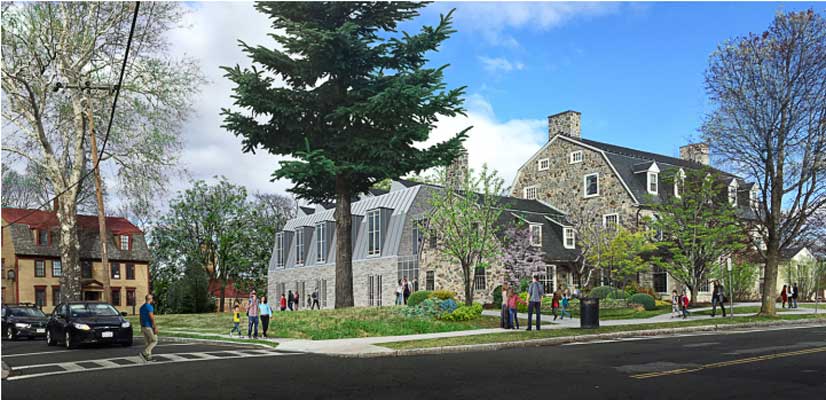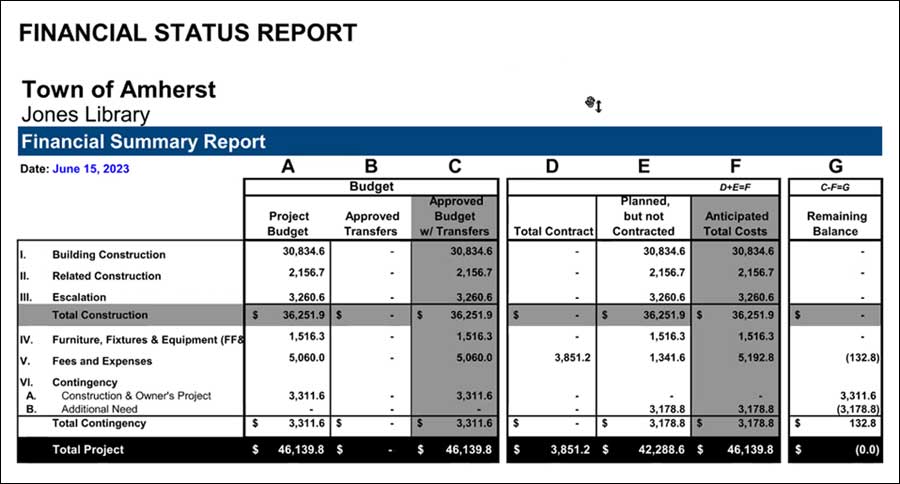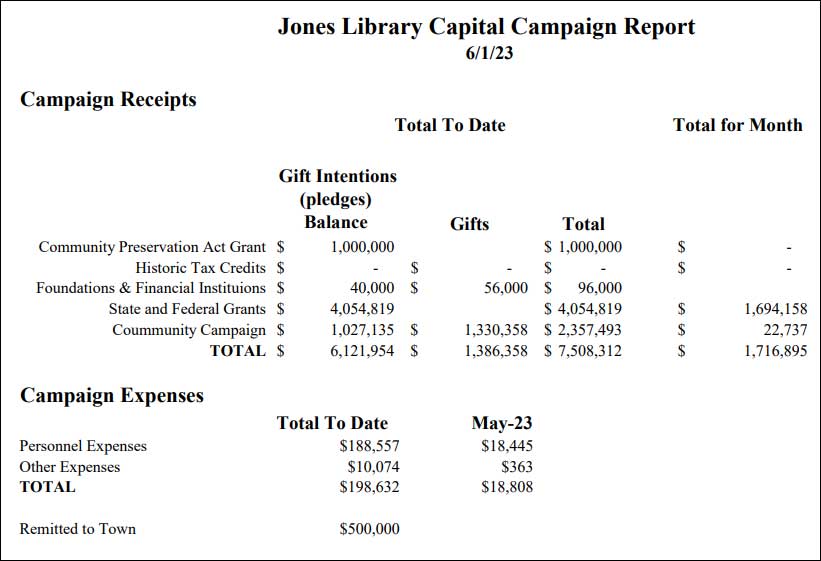Library Finds Good News In Building Project Cost Estimate But Funding Remains Millions Short

Photo: https://www.joneslibrary.org/
Jones Library News Highlights For The Week Of June 12, 2023
New Project Cost Estimate Is $2M Below Projection From 2022
The Jones Library Building Committee (JLBC) was in a celebratory mood at their June 15 meeting where they heard the result of an updated cost estimate for the $46.1 million renovation-expansion project. The new “reconciled” estimate for total construction came in at $34.2 million, compared to the reconciled estimate from last fall of $36.3 million upon which the $46.1 million project budget is based.
The cost estimate represents a reconciliation or averaging of independent analyses by Fennesy Consulting Services retained by project designer Finegold Alexander Architects (FAA) and Rider Lovett Bucknall (RLB) which was hired by the Town.
Owner’s Project Manager (OPM) Tim Alix of Colliers described the new numbers as encouraging and an indication that the current project budget is realistic and does not need to be changed. JLBC Chair Austin Sarat asked why the budget is not being reduced by $2 million to reflect the new lower expected construction cost.
Alix explained, “We developed a budget back in September that we’re willing to work with and we’re designing to that budget. We’re working towards that budget, but it’s good news where the estimate came in below that. But you know in two months’ time the market could be changed so we wouldn’t want to adjust the budget with every snapshot. [The purpose of] doing these estimates is to verify that we’re on budget not to change our budget.”

A couple potential threats to the renovation-expansion project were raised. Library Trustee Alex Lefebvre asked what would happen if “value engineering” changes that have been adopted to reduce costs, such as eliminating sawtooth roof skylights and restricting the use of cross-laminated timber construction, cause a worsening of Energy Use Intensity (EUI) measurements. The JLBC is depending on $200,000 in EUI incentives from Eversource.
Ellen Anselone of FAA answered that the committee might need to cross that bridge after a new energy model is run. Right now, she said, her main concern is finishing construction documents in time to meet a November deadline imposed by the Massachusetts Board of Library Commissioners who have awarded the project a $13.8 million construction grant.
Another concern, voiced by Will Fernandez of Colliers, is a new Massachusetts Building Energy Code set to take effect on July 1. The project management team will be meeting with Town Planning Director Christine Brestrup and Permit Administrator Jennifer Mullins to “keep pushing the approval and permitting process through.” FAA is aiming to have building permit forms submitted by July which will grandfather the project under the old code and avoid the need to design for the efficiency requirements of the new energy code.
See related: Letter: Town Discriminates Against Black Owned Businesses
The JLBC voted unanimously to recommend that Town Manager Paul Bockelman engage FAA to prepare Construction Bid Documents.
Alix sized up the prognosis for the project budget: “We should feel pretty comfortable that as we go forward those numbers are just going to solidify and hopefully the market helps us out in the end as far as inflation, and that we have a good bid environment when the time comes, because really, ultimately that’s what it’s going to come down to — who’s available to bid this at that time.”
Monthly Report Shows Capital Campaign Still Several Million Dollars Short
The monthly Capital Campaign Financial Report presented at the Jones Library Budget Committee Meeting of June 13 includes the $1.7 million cost escalation grant recently awarded to the Building Project by the MBLC. The Campaign has raised a total of $7,508,312 to date.
Placing a positive spin on money-raising efforts, the Jones Library has announced securing 80% of the Renovation and Expansion Project funding. However, based on the project budget and recent financial reports less than half of the Capital Campaign’s commitment of $16,516,676 has been raised.
The Amherst Indy has updated the Capital Campaign Funding Sources report from April 2023 with June fundraising results which has yielded an outstanding fundraising shortfall of $8,786,864. Any increase in the previously authorized $15.8 million Town of Amherst contribution will require approval by two-thirds of the Town Council.
The politically energetic library fundraisers are likely continuing to lobby local, state, and federal legislators to direct more funding to the controversial renovation-expansion. The actual viability of the project will come into focus once construction bids are received in early 2024.
The Jones Library Capital Campaign reports that in May 2023, $18,445 was spent on fundraising personnel expenses.


Cathy Shoen noted that the library is expected to maintain all services while the renovation is underway. I believe that a full accounting of the costs to set up these interim services was posted earlier on the Indy, but I don’t remember if those were estimates, or the actual costs based on finalized negotiations with rental sites and researched equipment and moving costs, and I also don’t remember where those funds were to come from. Are they in the renovation budget itself, and if so, are they to come from taxpayer funds, the MLBC grant, or fundraising? Or are they additional costs whose funding sources have not yet been identified?
I can’t fathom how the cost estimates for the Jones renovation could have gone down so substantially when everywhere else, construction costs, as well as the costs of borrowing, seem to be escalating. Where exactly are all of these savings coming from? Over in Shutesbury, where they have undertaken a very modest project to build a new library, costs appear to be continuing to spiral upward. According to a recent post on NextDoor there is a considerable disparity between the original cost estimate of $6.4M, the final cost estimate $7.5M and the latest bid $9.8 M. Opponents of that project suggested the cost estimator (Fennessey -one of the cost estimators for Amherst as well) left key elements out of their estimate – something we should pay attention to as well. I have taken a look at the latest Amherst estimates and can’t divine from them, how/where costs have decreased so substantially (and why). I think that if we’re going to celebrate that the library will now cost less, we’re entitled to some detailed exposition on the how and why. Why is Amherst unlike Shutesbury? Given that the Jones trustees have played fast and loose with their numbers from the outset, it’s reasonable for the public to demand better explanations and documentation. And given that bids for both the Shutesbury and North Amherst Libraries came in substantially higher than the final cost estimates, we need to make sure that the town does not take the deep dive into a final commitment to the proposed demolition and renovation before the construction bids for the Jones are in hand.
An example of playing fast and loose with the numbers appeared in today’s Daily Hampshire Gazette. In an article by Scott Merzbach, Library Capital Campaign co-chair Kent Faerber was quoted as saying, “Based on this current cost estimate, we have secured over 84% of the funds needed to renovate and expand the Jones Library,”
What Faerber doesn’t say, and what OPM Tim Alix has made clear, is that the project budget remains $46.1 million, and that is the number that the JLBC is designing around. The Library has actually secured 80% of the project budget.
A few percentage points may not seem like much, but it is the Town that will have the main responsibility of paying off debt equal to the entire project cost, if the renovation-expansion moves forward.
The Jones Library Trustees and Amherst’s Town government, along with Finegold Alexander Architects and Colliers International, their Owners’ Project Manager, continue to play fast and loose as well with the Town’s legal obligations under its $13.8 million library construction grant from the Massachusetts Board of Library Commissioners (MBLC).
In fact, I’d put it more starkly. They are playing with fire.
They have thereby solidly positioned the Town to 1) receive no additional funds from the Town’s MBLC construction grant; and 2) be liable to return the entire $2.7 million it has so far received under that grant, plus interest.
Where, therefore, in the current Town budget, is the contingency for this likely financial liability? This could very well turn out to be a municipal financial destruction project, as well as a physical demolition-expansion project. It depends on whether the Commonwealth cares that $13.8 million in public funds be expended as Massachusetts law requires. Hmmm.
Actually, since the Jones Library is on the federal Register of Historic Properties, as well as on the State Register, and since this demolition-expansion project is getting additional public grants, federal as well as state, I wonder whether these, too, are at risk.
It is no secret, what Massachusetts law mandates here. As long ago as 2016, our Historic Preservation Law required the Trustees and Town to submit the plans for this project to the Massachusetts Historic Commission (MHC) for 1) a determination of its adverse effects on the historic Jones Library building, and 2) the mandatory MHC consultation process for eliminating, minimizing, or mitigating those adverse effects.
For the requirement to submit their plans to the MHC “as early as possible in the planning stages of the project,” please see Title 605, Code of Massachusetts Regulations, Section 6.05 (2)(c) 13, for planning and design projects, and 605 CMR 6.05 (2)(d) 21, for construction projects.
For the definition of ‘adverse effects’ on a building, such as the Jones Library, which is listed on the State Register of Historic Properties, please see 950 CMR 71.05, “Criteria of Adverse Effect.”
For the mandatory MHC consultation process to eliminate, minimize, or mitigate adverse effects, please see 950 CMR §§ 71.02, “Scope, Purpose and Participants,” and 71.07, “Review of Projects.”
When it comes to these legal requirements, the Library Trustees and Town Councilors are unrepentant scofflaws. They have never complied. For the conclusion that they are thus in breach of their MBLC construction grant contract, please see 605 CMR (e), “Conditions of Eligibility.”
For the result, that breach of this contract will require them to return the $2.7 million received so far, plus interest, Ibid.
By the way, the Jones Library, Incorporated, is a non-profit. It pays no taxes. As I read the applicable regulations, the Historic Preservation Tax Credits that the Trustees and Town hope to receive for this demolition-expansion project are different from their obligations under the Massachusetts Historic Preservation Law. They are legally obligated to comply with the Historic Preservation Law separately from, and independent of, whether they are awarded those tax credits, and can sell them to an investor that can use them to reduce its tax liability.
It is not too late for the Trustees and Town Councilors to cure the breach of their MBLC construction grant contract. They can still submit their plans for this project to the MHC, and participate in what will doubtless be a process of historic preservation redesign. For instance, their plans for the Library’s Amity Street facade do not comply even with the Historic Preservation Restriction Agreement that the Trustees signed in 2017.
As a past president of the Jones Library Trustees, and a lawyer (D.C. Bar), I’d like to see the Trustees and Town Councilors change course. Doesn’t that make a lot more sense than what they are doing now?
Sarah, you have been a voice in the wilderness regarding the correct historical review process and how it has been ignored by those charged with being stewards of historic assets and the grant money that impacts them.
At the 6/15 JLBC meeting, FAA’s Ellen Anselone did remark that she needed to meet with the “local historic folks.” However, at this late date, after the completion of the Design Development phase of the project, it is hard to see how any meaningful evaluation of adverse impacts to the Jones Library by the renovation-expansion design can be achieved. Amherst and Massachusetts Historical Commissioners will likely be reluctant to require changes to a project so far along and may feel pressured to rubber stamp the proposed design or risk disrupting the schedule. And as you and others have pointed out, the building project entails massive changes to the historic Jones.
The losers will be the public who benefit from historic preservation and who value proper compliance with state regulations.
Unfortunately, throughout this Jones Library project, the word “renovation” has been used rather euphemistically, and not in its literal sense: replacing an old part with a new but essentially identical part.
Some might insist on calling such a project a “restoration” instead, but even a restoration can go remarkably awry
https://www.youtube.com/watch?v=QTli1HU9axY&ab_channel=MrBean
as lovers of Rowan Atkinson’s character “Mr. Bean” can readily attest.
And although great care has gone into the renovation/restoration of La Cathedral de Notre Dame de Paris after its recent catastrophic fire, though other aspects of that much bigger project in France have also been ripe for criticism:
https://www.dezeen.com/2021/12/02/notre-dame-interiors-disney/
Whether or not The Jones Library, Incorporated, can raise enough funds on its own, it’s time to acknowledge that what we’ve known for nearly a century as “Amherst’s living room” will be indelibly transformed into something quite different.
While not quite as endearingly humorous as Mr. Bean’s transformed version of Whistler’s Mother, many of us who don’t like the “renovated Jones” someday will?
But most of us still here will still get “Jones’d” — we’ll still get stuck with paying the bill!
And what was once the Jones will be no more….
Please look it up if you don’t know it, with the polite version being definition 2:
https://www.urbandictionary.com/define.php?term=jones%27d
Curiously, the word “Renovation” does not appear on the US Department of the Interior webpage with links to current federal guidelines on the treatment of historic properties:
https://www.nps.gov/orgs/1739/secretary-standards-treatment-historic-properties.htm
though the category “Rehabilitation” seems closest to what The Jones Library, Incorporated, and its design teams have been up to in recent years. Clearly the proposed Jones demolition/expansion project goes much further away from the “Preservation” category than did the Jones “atrium” project from 3+decades ago.
Besides following these prudent — yet apparently voluntary! — federal standards, as attorney Sarah McKee has repeatedly pointed out, The Jones Library, Incorporated, has both statutory and contractural obligations to follow the stricter historic preservation standards imposed by the Commonwealth of Massachusetts.
Even if The Jones Library, Incorporated, can skirt voluntary standards, how can it continue to ignore the obligatory ones?